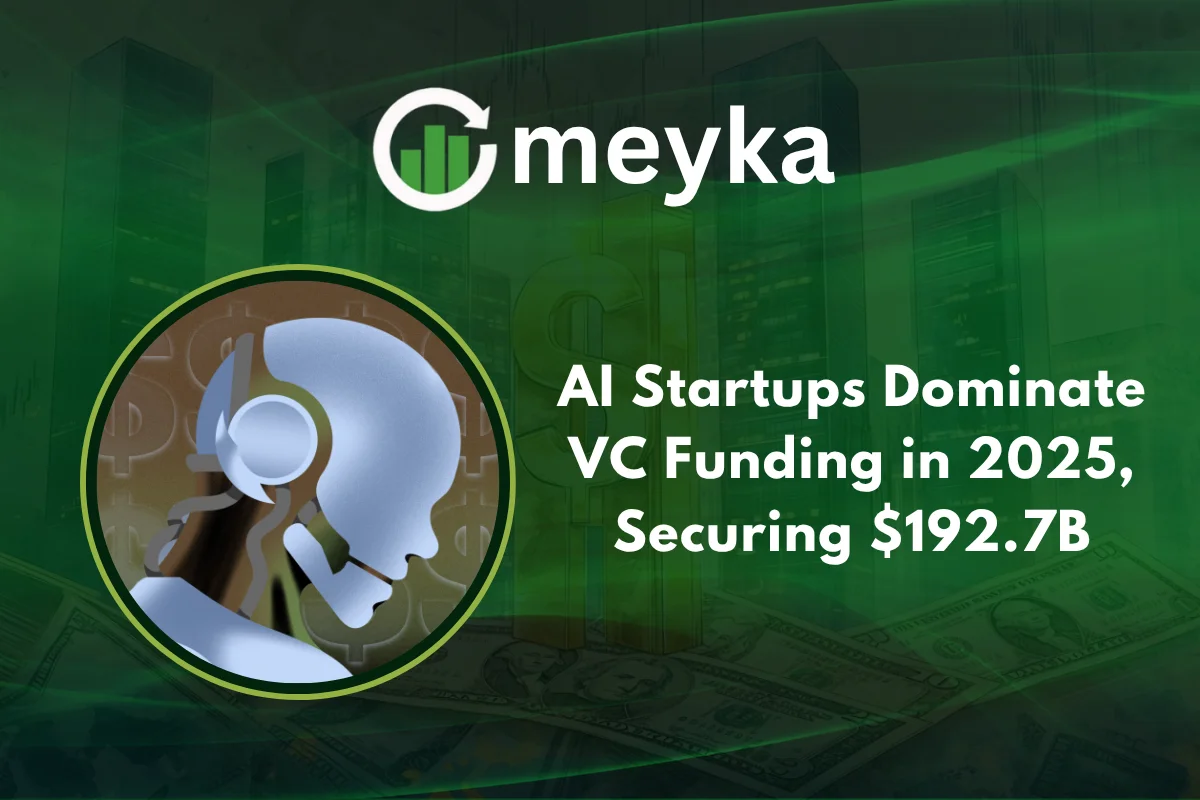AI Startups Dominate VC Funding in 2025, Securing $192.7B
The year 2025 marks a turning point in the global investment landscape. Artificial Intelligence (AI) startups have taken the spotlight, attracting record-breaking VC funding worth $192.7 billion. This surge reflects how deeply AI is shaping industries, transforming business models, and redefining opportunities in the stock market. Investors are betting big on the next wave of disruptive technologies, with AI at the center of it all.
The Rise of AI Startups in Venture Capital
Venture capital (VC) has always fueled innovation, but the scale of investment in AI this year is unmatched. The $192.7B milestone demonstrates investor confidence in AI’s long-term growth. From generative AI applications to robotics, healthcare innovations, and autonomous systems, startups are driving solutions that promise to deliver both societal impact and financial returns.
Unlike previous funding cycles that spread capital across various tech niches, 2025 is clearly the year of AI dominance. Startups specializing in machine learning, natural language processing, AI-driven automation, and cybersecurity are securing the lion’s share of VC attention.
Why Investors Are Flocking to AI
The momentum behind AI funding is fueled by several factors:
- Exponential Market Demand: Businesses across finance, healthcare, logistics, and retail are embedding AI into operations to cut costs and improve efficiency.
- Strong Exit Opportunities: AI companies are increasingly going public, with many joining the ranks of AI stocks that deliver outsized returns.
- Government Support: Global policies favor AI research, digital transformation, and infrastructure that supports innovation.
- Rapid Technological Breakthroughs: Tools like advanced GPUs, cloud platforms, and AI chips have made AI development faster and cheaper.
Investors view AI as not just a trend but as the backbone of the next economic cycle.
AI Startups Reshaping Industries
The breadth of AI applications is driving capital allocation into multiple verticals:
- Healthcare AI: Startups are creating precision medicine platforms, diagnostic tools, and robotic surgical assistants.
- Financial AI: Firms use algorithms for fraud detection, risk analysis, and personalized banking.
- Retail and E-Commerce AI: Recommendation systems, AI-powered logistics, and chatbots enhance customer experience.
- Sustainable AI: Energy optimization and climate-tech startups leverage AI for sustainability goals.
Each of these categories presents strong stock research opportunities, as many of these startups are either IPO-ready or becoming acquisition targets for tech giants.
AI Stocks and the Broader Stock Market
The rise of AI startups has influenced investor behavior in public markets. AI stocks are some of the fastest-growing equities, drawing comparisons to the dot-com boom but with more robust fundamentals. Companies that went public in 2023 and 2024 now enjoy expanded valuations, and many are already part of major indices.
Institutional investors are increasingly allocating capital to AI-themed ETFs and funds. Retail investors, too, are drawn to the potential of exponential growth. The focus on stock research surrounding AI companies has intensified, as analysts seek to identify which firms will emerge as long-term leaders.
Global Competition in AI VC Funding
While the United States continues to dominate VC funding, 2025 has seen notable contributions from other regions:
- China has aggressively funded AI startups, particularly in manufacturing and autonomous mobility.
- Europe has prioritized ethical AI and green AI, attracting significant capital in health tech and climate solutions.
- India has emerged as a growing hub, with startups leveraging AI in fintech and agriculture.
The globalization of AI innovation means competition is fierce, but it also fosters diverse advancements.
Challenges Facing AI Startups Despite Funding
Despite the unprecedented influx of VC funding, AI startups face hurdles that could shape their trajectories:
- Regulatory Scrutiny: Governments are tightening AI regulations, focusing on transparency, ethics, and privacy.
- Talent Shortage: The demand for AI engineers and researchers far exceeds supply, driving up hiring costs.
- High Burn Rates: Many startups struggle to balance aggressive growth with financial sustainability.
- Market Saturation: With so many companies entering the AI space, differentiation is becoming harder.
These challenges underscore the importance of strategic planning and responsible innovation.
The Future of VC Funding in AI
Looking ahead, VC investment in AI is expected to sustain momentum. Analysts predict that funding could cross $200 billion in 2025, especially as AI applications expand into education, law, defense, and entertainment.
The integration of AI with quantum computing, edge computing, and next-generation robotics could unlock entirely new sectors, keeping investor interest strong. For stock market participants, this means even greater opportunities for long-term gains through carefully selected AI stocks.
Conclusion
The $192.7 billion in VC funding secured by AI startups in 2025 highlights the extraordinary role AI plays in shaping the future of business and technology. This investment surge underscores the shift of venture capital toward industries with transformative potential.
For investors, entrepreneurs, and policymakers, AI represents both an opportunity and a responsibility to harness innovation while ensuring ethical and sustainable growth.
AI is no longer a buzzword; it is the foundation of modern innovation. As more startups mature and enter public markets, the ripple effects will be felt across the global economy and the stock market for years to come.
FAQs
AI startups secured this record funding due to strong demand for AI technologies, attractive stock market opportunities, government support, and rapid advancements in computing power.
As AI startups mature, many go public or get acquired by large corporations. This fuels growth in AI stocks, making them popular targets for stock research and retail investment.
Besides the U.S., China, Europe, and India are major contributors to AI VC funding, each focusing on unique sectors like manufacturing, green AI, and fintech.
Disclaimer:
This content is made for learning only. It is not meant to give financial advice. Always check the facts yourself. Financial decisions need detailed research.





